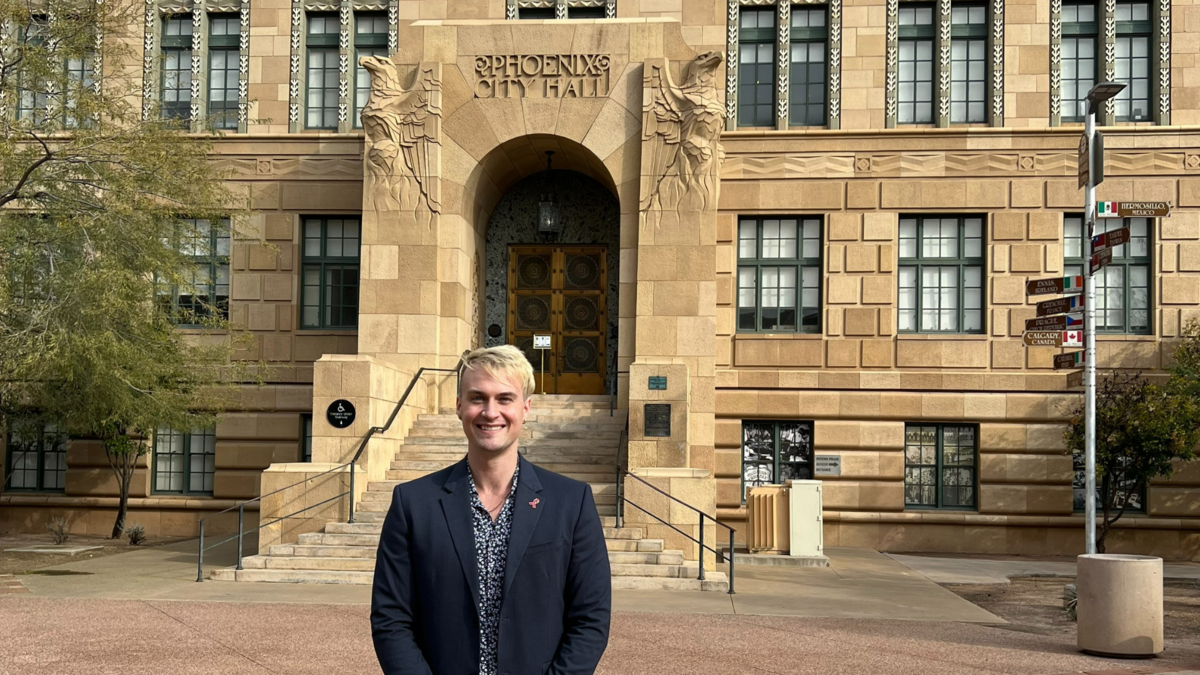Professor appointed to committee working to end HIV epidemic in Arizona

Edson College Assistant Professor Angel Algarin is sworn in as a member of the city of Phoenix’s Fast-Track Cities Ad-Hoc Committee on Jan. 24. Photo courtesy Angel Algarin
Ending the HIV epidemic is a big task, but Angel Algarin is up for it. The assistant professor at Arizona State University’s Edson College of Nursing and Health Innovation has dedicated his research to this effort, and just recently, he joined forces with the city of Phoenix.
In January, Algarin was sworn in as a member of the city’s Fast-Track Cities Ad-Hoc Committee, joining 22 others.
“As a gay Latino scholar, I am honored to serve as a member of this committee as we work together to find solutions to ending the HIV epidemic,” he said.
The Fast-Track Cities Initiative is a global partnership between cities and municipalities and four core partners — the International Association of Providers of AIDS Care (IAPAC), the Joint United Nations Programme on HIV/AIDS (UNAIDS), the United Nations Human Settlements Programme (UN-Habitat) and the city of Paris. Together, their aim is to end the HIV epidemic by 2030.
Below, Algarin shares about his own work in this area and what the committee has planned.
Question: Can you give an overview of what this appointment means and what you will do as a committee member?
Answer: As a committee member, I will work alongside people living with HIV, medical providers, community-based organizations, local HIV advocacy groups and government departments living and serving in the city of Phoenix. Together, the ad hoc committee will develop and promote services that are innovative, safe, accessible, equitable and free of stigma and discrimination. They will encourage and foster community leadership and engagement to build demand and deliver services.
Q: Talk about the significance of this appointment and what it means to you personally.
A: In 2022, Arizona saw a 20% increase in new HIV infections, rates we haven't seen since the early '90s. Black and Latino Arizonans continue to face a disproportionate incidence of new HIV infection, with incidence rates of 42.3 and 17.1 per 100,000 people, respectively (compared to white Arizonans at 7.2 per 100,000).
I’m excited to work together with the other members to find and implement equitable solutions to get us to our 90-90-90-0 goals — that is, 90% of people know their HIV status, 90% of those living with HIV on antiviral therapy, 90% of those living with HIV on antiretroviral therapy virally suppressed, and 0% stigma and discrimination against people living with HIV.
Q: How can this role help amplify the ongoing work at ASU/Edson to end HIV?
A: This position continues to demonstrate ASU's and Edson's commitment to social embeddedness and serving the community around us. Following the community and academic partnership series to end the HIV epidemic in Arizona, hosted by Edson faculty members Joseph Daniels, Alyssa Robillard, Rachel Gur-Arie and myself, we learned the community wants us to show up and be involved.
In response to the lack of HIV-related socio-behavioral data for the state, my lab, the Stigma and HIV-related Health Lab (SHH Lab), has compiled and released a report leveraging data from the national American Men's Internet Survey (AMIS) conducted by PRISM at Emory University. This report includes the responses of over 1,000 men who have sex with men in Arizona between the years of 2017–21, which we hope can be used to inform future research, practice and policy.
I believe the continued partnerships between ASU and the community will lead to data-driven, community-centered projects prepared to end the HIV epidemic in Arizona.
More Health and medicine

Bird flu: Your questions on symptoms, spread and safety answered
Bird flu is no longer only “for the birds.”Infections have expanded beyond wild birds and poultry to a range of animals — from mice to mountain lions, dairy cows to domestic cats, and polar bears to…

Making medicine side-effect free
Many drugs that address medical conditions can come with serious side effects. In drug commercials, the litany of potential side effects is often longer than the benefits being touted. Carl…

Diagnostic research happening at ASU focused on detecting diseases earlier to save lives
It was one of America’s founding fathers, Benjamin Franklin, who may have foreshadowed today’s health care innovation when he quipped the adage: An ounce of prevention is worth a pound of cure.In…

